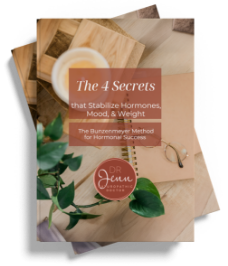“It’s my age! That’s why I can’t seem to lose weight.”
Have you heard this before? I sure have!
But guess what? It doesn’t have to be this way.
If you’re not able to lose weight (even with trying to eat well and maintain active lifestyle) this is often a sign that the thyroid is starting to become sluggish causing a lower metabolism and a plethora of thyroid symptoms.
Do you suffer from the following symptoms?
- Difficulty losing weight or unexplained weight gain
- Cold intolerance
- Hair loss – scalp and/or eyebrows
- Dry skin
- Coarse/dry hair
- Decreased memory and concentration
- Decreased libido
- Low energy
- Muscle cramps and/or muscle aches
- Infertility
- Perimenopause/menopause symptoms – hot flashes, insomnia, weight gain, anxiety.
If you nodded your head at a few of these, then you may have a thyroid condition.
And if so, you might be wondering what can be done – naturally – to help kickstart your metabolism and balance your thyroid?
Short answer- lots! That’s why I’ll explain how I work with patients when these symptoms are presented.
Assessment
First, I like to run functional tests to assess thyroid. Depending on the individual, these tests could be any or all of the following:
- Thyroid Panel- TSH, Free T4/T3, anti-thyroid peroxidase antibody
- Vitamin B12 and Vitamin D
- Celiac Screening (to test for a gluten allergy)
- IgG food sensitivity testing- to assess possible food allergies/intolerances that could be affecting the immune system
- Zinc and Selenium
Health history and physical exam is also crucial because by assessing previous health history and doing a physical exam helps to uncover hidden signs of thyroid disease, as well.
Treatment
Stress management is another hidden aspect of thyroid support – managing stress and supporting tiny little glands called Adrenals. This is often a missing link for thyroid treatment and overall metabolism balance.
Watch for my upcoming Stress Management blog which will offer key tips and strategies on stress resiliency and Adrenal support.
As for thyroid balance, many herbs and nutrients can dramatically improve symptoms. Selenium helps convert the inactive thyroid hormone T4 to our active T3 hormone. T3 is responsible for increasing metabolism in our peripheral tissues and therefore without this conversion, our metabolism will decrease.
Thiamine or vitamin B1 has been shown in studies to recover fatigue within days of beginning supplementation in hashimoto’s and hypothyroidism. Blue flag herb has been used for thyroid detoxification. Guggul myrrh herb also helps with T4 to T3 conversion and can also be used to keep cholesterol in healthy ranges. Ashwagandha enhances mental clarity and exhaustion and has been used traditionally to support adrenal glands.
Choosing the Right Support
It’s important to understand that each herb needs to be individually picked pending on the person’s symptoms.
That’s why I highly suggest working with a health professional who is trained in assessing what is best for treatment options – not doing so could promote the wrong use of these herbs and could be detrimental to the thyroid.
Remember, it’s all about choosing someone who is constantly excited for your health and all that you are capable of achieving. It is possible and you are beyond worthy.
Don’t hesitate to reach out with any thyroid questions. I always love helping you on your journey to optimal health.


